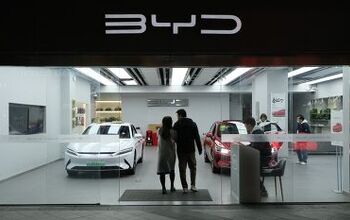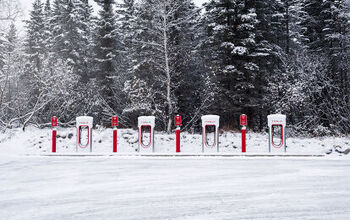Survey: EV Interest Varies Wildly Between Nations, Ditto for Shared Ownership

If you follow the automotive industry at all, you’re undoubtedly aware that the United States is a region that hasn’t quite embraced automotive electrification on the same level as the rest of the developed world. Americans travel longer distances and have particular tastes, making EVs more popular in places like Europe and China. It also hasn’t passed the same sweeping regulations to ensure their advancement.
Whatever the cause, a new survey from London-based OC&C Strategy Consultants attempted to tabulate the disparity — asking 2,000 consumers (apiece) in the U.S., China, Germany, France and United Kingdom between March and April of 2019.
Their findings? Only about half of the surveyed Americans felt EVs were worth their consideration as a potential successor to their current ride. In China, 90 percent said they would seriously consider buying electric. Between 64 and 77 percent of respondents in Europe said the same (depending on country).
This disparity could help explain why so many automakers hellbent on electrification are also deeply interested in expanding their footprint in China. Considering the market’s extremely strong interest in EVs, which doesn’t mesh perfectly with the country’s recent sales headaches, we wonder about the validity of the data coming out of the PRC. Still, John Evison, one of the survey’s co-authors, told Reuters the group did not receive any outside funding for its study. No shenanigans, apparently.
OC&C also noted that the Chinese are overwhelmingly okay with the idea of “fully-shared mobility options.” That concept doesn’t seem to fly in other parts of the world where communism hasn’t taken hold. Customers in the United States, Germany, France and the United Kingdom all want to retain private ownership of their vehicles. But over 90 percent of Chinese respondents said widespread sharing was absolutely fine.
From Reuters:
Ride-hailing companies Uber Technologies Inc and Lyft Inc say they aim to reduce private car ownership.
But survey respondents in Western countries, including younger generations, said owning a car remained an important status symbol offering convenience and reliability not matched by car-sharing or taxi services.
The survey results also put a damper on companies working on robotaxis, with a vast majority of all respondents saying they would strongly prefer owning a fully automated car, as opposed to sharing it.
Some of this could be the result of geographical differences. Drivers in the United States tend to cover more miles and live in places where ride-hailing services and electric vehicle ranges can’t always cover them. Americans, however, are also more prone to seeing individualism as a virtue and like to maintain their personal freedoms whenever possible — which could be why they’re also not as stoked for autonomous vehicles.
The survey found that roughly one third of Western consumers are dubious of self-driving cars, while only 4 percent of the Chinese respondents hold similar feelings. This all adds up to a split global market with major industry players chasing trends that really only seem to be going over big in China. OC&C recommends automakers stop dumping all of their money in an attempt to create “the next shared mobility revolution” and invest instead in electrification and services that cater more to individual owners.
[Image: Xujun/Shutterstock]

A staunch consumer advocate tracking industry trends and regulation. Before joining TTAC, Matt spent a decade working for marketing and research firms based in NYC. Clients included several of the world’s largest automakers, global tire brands, and aftermarket part suppliers. Dissatisfied with the corporate world and resentful of having to wear suits everyday, he pivoted to writing about cars. Since then, that man has become an ardent supporter of the right-to-repair movement, been interviewed on the auto industry by national radio broadcasts, driven more rental cars than anyone ever should, participated in amateur rallying events, and received the requisite minimum training as sanctioned by the SCCA. Handy with a wrench, Matt grew up surrounded by Detroit auto workers and managed to get a pizza delivery job before he was legally eligible. He later found himself driving box trucks through Manhattan, guaranteeing future sympathy for actual truckers. He continues to conduct research pertaining to the automotive sector as an independent contractor and has since moved back to his native Michigan, closer to where the cars are born. A contrarian, Matt claims to prefer understeer — stating that front and all-wheel drive vehicles cater best to his driving style.
More by Matt Posky
Latest Car Reviews
Read moreLatest Product Reviews
Read moreRecent Comments
- Tassos Jong-iL This would still be a very nice car in North Korea.
- Jeff One less option will be available for an affordable midsize sedan. Not much can be done about GM discontinuing the Malibu. GM, Ford, and Stellantis have been discontinuing cars for the most part to focus on pickups, crossovers, and suvs. Many buyers that don't want trucks or truck like vehicles have moved onto Japanese and South Korean brands. Meanwhile large pickups and suvs continue to pile up on dealer lots with some dealers still adding market adjustments to the stickers. Even Toyota dealers have growing inventories of Tundras and Tacomas.
- Lorenzo This car would have sold better if there was a kit to put fiberglass toast slices on the roof.
- Lorenzo The Malibu is close to what the 1955 Bel Air was, but 6 inches shorter in height, and 3 inches shorter in wheelbase, the former making it much more difficult to get into or out of. Grandma has to sit in front (groan) and she'll still have trouble getting in and out.The '55s had long options lists, but didn't include a 91 cubic inch four with a turbo, or a continuously variable transmission. Metal and decent fabric were replaced by cheap plastic too. The 1955 price was $1765 base, or $20,600 adjusted for inflation, but could be optioned up to $3,000 +/-, or $36,000, so in the same ballpark.The fuel economy, handling, and reliability are improved, but that's about it. Other than the fact that it means one fewer sedan available, there's no reason to be sorry it's being discontinued. Put the 1955 body on it and it'll sell like hotcakes, though.
- Calrson Fan We are already seeing multiple manufacturers steering away from EVs to Hybrids & PHEVs. Suspect the market will follow. Battery tech isn't anywhere close to where it needs to be for EV's to replace ICE's. Neither is the electrical grid or charging infrastructure. PHEV's still have the drawback that if you can't charge at home your not a potential customer. I've heard stories of people with Volts that never charge them but that's a unique kind of stupidity. If you can't or don't want to charge your PHEV then just get a hybrid.


































Comments
Join the conversation
If the goal is to save our planet from global warming - which I think is an excellent idea, because it’s the only one we have - then electric cars are not the 'answer'. The real answer is not so much to switch cars to electric, but first to change how electricity is generated. ‘Electricity’ is not a primary energy source (unless you’re going to try and capture lightening). It’s a way of transmitting energy. It doesn’t come out of a hole in the ground. Some other primary source of energy must first generate, and then be converted into, electricity. Preferably that would be solar, wind, or tidal, but in this country, about 85% of energy still comes from either fossil fuels or nuclear – https://www.eia.gov/tools/faqs/faq.php?id=427&t=3 Unless this country, and the world in general, makes major moves to generate electricity from renewable sources, the harsh reality is that most ‘electric’ cars today are really just powered by natural gas, coal, or nuclear energy, whatever was used to generate the electricity in the first place. Electric cars are not honestly ‘zero’ emissions (smug bumper stickers notwithstanding), they’re remote emissions. The emissions simply come from the plant that generated the electricity, burning whatever they did to do it. It’s different if you happen to live ‘off the grid’ and generate all your own electricity with solar panels, or live in a place like Oregon that generates 76% of its electricity from hydroelectric - https://www.eia.gov/state/?sid=OR But that’s not the case for most people in most of the country. If we really want to save our planet, we need to elect leaders who will actually move us off of fossil and nuclear fuels and take the hard, expensive, and politically painful steps of creating a renewable energy infrastructure. Only then will electric cars make broad sense for the country, and world, at large. Otherwise, simply driving an ‘electric’ car often doesn’t accomplish much, especially if you happen to live in one of the 18 states that uses coal as the primary source of energy to generate electricity - https://www.eia.gov/todayinenergy/detail.php?id=37034
This news probably doesn't bode very well for the climate change cult in the US. Anyway, I've long thought that Danish child and the other climate protesters should go to China and protest there. China uses four times the coal we do, and that their public is more inclined to embrace electric cars shows they might have more sympathetic ears there.